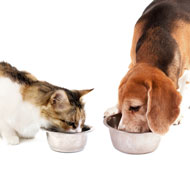
Should veterinary professionals be warning of the zoonotic risks of raw pet foods?
The Foods Standards Agency (FSA) has just published its ‘Food and You 2014’ survey report, based on information about peoples’ behaviours, attitudes and knowledge relating to food safety issues. It should prompt veterinary professionals to consider the advice they give to clients about feeding raw meat and poultry to their pets.
The survey, based on a sample of 3,453 interviews, provides data on people’s reports of their food purchasing, storage, preparation, consumption and factors that may affect these, such as eating habits, influences on where respondents choose to eat out and experiences of food poisoning.
Eight out of ten respondents reported cleaning behaviours in line with recommended practices, saying they always washed their hands before starting to prepare or cook food and after handling raw meat, poultry or fish.
Around half (51%) of those who reported storing raw meat and poultry in the fridge reported practices in line with those recommended to avoid cross contamination; and 49 per cent said they always used different chopping boards for different types of food.
Set against this FSA report, an article published in the September edition of Foodborne Pathogens and Disease entitled, ‘Investigation of Listeria, Salmonella, and toxigenic Escherichia coli in various pet foods’, should ring some alarm bells.
It reported that 66 of 576 samples of raw dog or cat foods tested in the US were positive for Listeria, including 32 that were positive for L. monocytogenes. In addition, 15 of the samples were positive for Salmonella and two were positive for Shiga toxin-producing E coli.
Not surprisingly, the authors conclude that consumers should handle these products carefully, being mindful of the potential risks to human and animal health.
This article is the latest in a series of studies warning of the problems associated with the feeding of raw pet foods – perhaps the most comprehensive recent overview being provided by Lisa Freeman and others at the end of 2013 [JAVMA 243(11) December 1, 2013].
The BARF (Biologically Appropriate Raw Food) and RMB (Raw Meaty Bones) lobbies and proponents of prepared pet foods continue to debate the health implications of their particular approaches to nutrition and the respective weight of scientific supporting data.
Irrespective of this, isn’t there a more fundamental question as to the wisdom of introducing potentially contaminated food sources into the kitchen, unnecessarily, in the first place? And shouldn’t veterinary professionals be taking the lead in warning clients about it?



 The latest
The latest